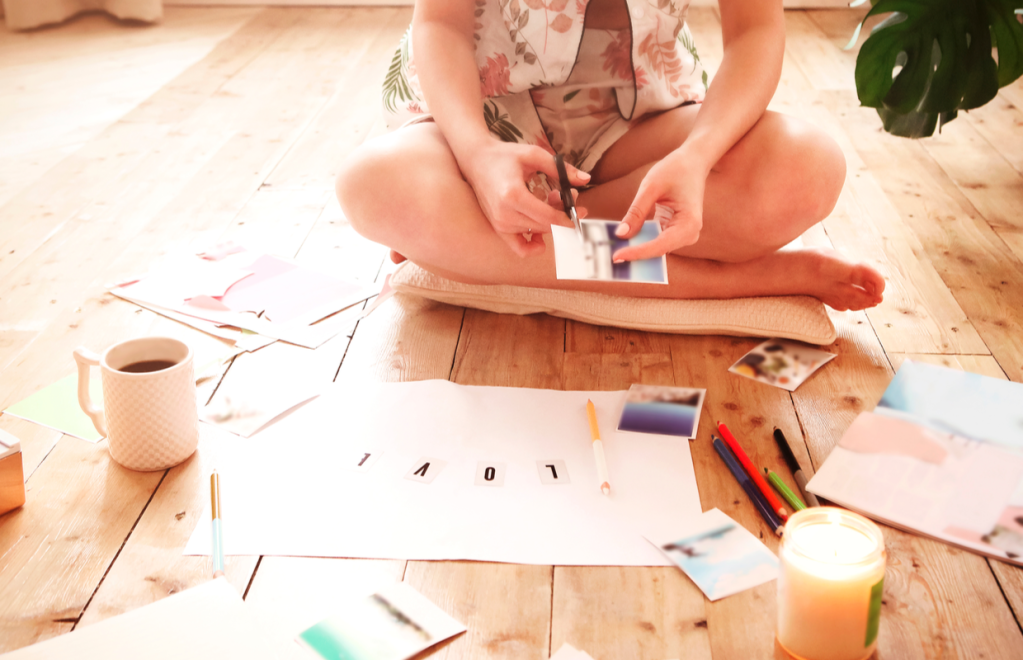How to be more hopeful and positive about the future
Stuck in the past or dreading the future? Discover how to be more hopeful about what the future may hold with these expert tips...

That sense of a blank slate is what has always excited me most about saying goodbye to the old year and ushering in the new. And yet, though I’m a lifelong Hogmanay fan, even I can’t help feeling daunted by this one. Everything we’ve lived through over the past two years has left us bothered and bewildered.
I yearn to feel that familiar sense of delicious anticipation but, at the same time, my mind is now a whirling sea of negative what ifs? What will happen with the new Covid variant? What if there are more lockdowns? Or what if the HGV driver crisis has an impact on supplies of my beloved Tunnock’s Caramel Wafers? The daily bombardment of negative news headlines doesn’t exactly help.
So how might we generate a sense of optimism to carry us through 2022 and beyond? Is it foolish even to try? According to Bernadette Russell, author of How To Be Hopeful (Elliott & Thompson, £9.99), the first step is to make a conscious decision to work on a mindset shift…
10 tips to feel more hopeful about the future

1. Choose to make your mindset more hopeful
‘In order to survive, humans have a natural negativity bias that causes us to pay attention to perceived dangers or threats. There’s no blame or shame attached to that – it’s just the way we’re made. But that’s why we have to actively choose to feel more hopeful, and make it a daily habit,’ says Russell.
The idea was a new one to me, perhaps because I have always associated the experience of feeling hopeful with positive external events. Someone tells you of a potential new work opportunity or an attractive person asks you on a date, ergo the future looks brighter.
I’m not sure that I understand how to conjure hope out of thin air. But Russell observes that from her research, far from living a happy life, it is actually going through difficult times that helps others, herself included, to become more hopeful.
How difficult times make us more hopeful
‘Most people I interviewed for the book had found hope through the experience of living through despair and sadness – hope became something they learned to reach for during dark times,’ she explains.
By her own admission, Russell had a ‘fairly traumatic childhood’ and taught herself early on how to use hope as a shield against the problems of the world. ‘From a young age, I taught myself to look for the light and find the good in people and circumstances,’ she says. ‘Hope can be fuel to move forward with your life.’
2. Accept life’s difficulties
There is great power in acceptance and pushing through difficulty, believes the therapist Shomit Mitter. ‘Building tolerance for the hard stuff in the world makes us stronger. We struggle to lift a heavy weight in the gym or study for a difficult exam, and by accepting that we need to go through it to build physical or mental strength, we come out the other side.’
Ironically, if we can learn to accept life’s difficulties, he believes that we are more able to take action to change the situation. ‘Acceptance isn’t about being resigned to a situation that you don’t like – far from it,’ says Mitter. ‘It just means that we can approach life from a place of peace rather than a place of pain. If you can acknowledge, “OK I’m going through challenging times: How can I learn to benefit from what’s going on?” that’s a far more helpful attitude.’

3. Be more open to change
In his work, Mitter meets many clients who are struggling to make meaningful changes in their lives. Why is change so hard? ‘The short answer is that we are creatures of habit,’ says Mitter, ‘and however uncomfortable our life circumstances might be in the here and now, we often choose to stick with what we know rather than face the uncertainty of something new – even if it could be a change for the better. It’s the one thing I find hardest to get my clients to overcome: their reluctance to change.’
What’s behind this unwillingness is how we see ourselves in the world. ‘The single biggest motivator that impels us is identity. We look in the mirror and tell ourselves, this is who I am, this is how I find meaning in life, and we get attached to that,’ says Mitter. ‘If we make a change, even for the better, our bearings change. Who will my friends be? Will they still like me? Will I even have friends any more?’
How change affects our identity:
This block to change certainly rings true for me. For years, I longed to make a career switch into photography. I fobbed myself off with the usual excuses – no time, no money, fear of failure. But the truth was that so much of my identity was bound up with being a journalist that I found it destabilising to comprehend doing anything else. Not to mention that, as an extrovert, I derived great validation and meaning from my professional peer group, many of whom had become long-established friends.
Ironically, when I did take the leap to successfully apply to art school last year, I discovered an energised sense of self and, as well as creating many new friendships, I have had lots of meaningful conversations with old colleagues who are thinking about making similar pivots in their personal or professional lives.
4. Feel more hopeful about the future through visualisation
In order to feel more hopeful about the future, a good place to start is to establish a visualisation practice. This is different from idle daydreaming in that it involves creating a daily ritual, ideally as part of your morning routine, as popularised by Hal Elrod in the bestselling book The Miracle Morning (John Murray, £10.99).
‘There is something revolutionary about the proposal that we consciously try to imagine an ideal future,’ says Bernadette Russell. ‘Culturally, it’s at odds with how we’re trained to think. I’m interested in science fiction and I find it fascinating that the genre is awash only with dystopian visions. Given that right now we are experiencing climate disasters and being bombarded with negativity, it takes great courage to think about a brighter world.’
It’s what inspired Russell to work with a group of artists in Hackney, east London, on the Tomorrowland project, where participants created a vision of London in 2050. ‘It was a lovely exercise to try and imagine a better future in a non-dystopian way; to show that there are other, positive stories to tell, not just tales of disaster.’
5. Stop fixating on the past
Shomit Mitter believes there is another reason that many of us struggle to feel hopeful when visualising an ideal future. ‘We are fixated on the past because we have memory. The past is fixed – if it contains anything traumatic, those will override the many happy events.’ Our innate tendency to pay attention to danger can keep us transfixed only on what might go wrong with our plans to create a better future.
‘The challenge is to keep reminding yourself that the past does not exist anywhere but in your mind,’ says Mitter. And the future does not exist anywhere either, except in your imagination. But it does offer something the past does not – choices. That is a huge gift. Focus on that and suddenly you will see: I could do X, Y or Z – and you can have fun with it,’ he adds.

6. Make a vision board to feel more hopeful about the future
Terry Bowen is a coach who regularly runs ‘Cut and Paste Your Future’ vision board workshops. ‘Visualisation is important because when dreams only exist in your mind, they tend to fizzle out. If you have a visual representation of what you want to achieve,’ he says, ‘it gives you an incentive to remember what it is you really want, and that can inform your daily priorities.’
By making a vision board, a mood board of your future, you focus all your senses and creativity on what you want your future to look like. ‘A vision board gives you something to look forward to, especially if you’re having a bad day,’ says Bowen.
How to make a vision board:
An advocate of making a physical board with paper, magazines and glue, Bowen believes that although you can make such boards on Pinterest or other digital platforms, having a physical object to look at is more powerful. Indeed, he used this technique to attract a new partner, now his husband, into his life a few months after following the process.
‘Think of how many photos you have on the camera roll of your phone. How often do you look at any of them, as opposed to a photo that you put on the wall? Making it by hand, you take your time searching through magazines and printing out images from the internet of things that you want to have in your life. You are priming your brain to pay attention. Also, you’re more likely to keep something you’ve made by hand and can look back on it in years to come to see how many things you have manifested.’
7. Make an action plan to achieve your goals
All this dreaming and scheming is all very well, but it’s unlikely to get you very far unless you take action – something the bestselling book The Secret by Rhonda Byrne (Simon & Schuster, £16.99) failed to address.
‘The trouble is that people are often very cagey about taking any action unless they can see the whole way ahead,’ observes Mitter. ‘In reality, that’s rarely possible. It’s only by taking the first step, and being open to opportunities that things start to change.
‘You go from A to B, and when you reach B, something surprising happens that you could never have predicted, and that takes you further towards your goal. If you want to succeed, you need to take bold action, even though you can’t see how you are going to achieve what you want.’
Obviously, if you want to, say, run a marathon, it is logical that you must move your body in some way to get started. But there is another reason why taking action is important. ‘Actions signal to the deep unconscious mind that you are really serious about changing,’ says Mitter. ‘If I merely announce I want to give up smoking every day, that’s not going to have an effect. But if I throw away my cigarettes and lighter, my subconscious sits up and pays attention: “Ooh, she is really serious about this, I’d better help her out,” it says.’
What to do when your goal has no clear action plan:
If the path to achieving our goal is less linear, or if we are feeling dispirited, knowing what action to take in the first place can feel overwhelming. ‘When I decided I wanted to meet a new partner, I wasn’t sure what action to take. So, the first thing I did was focus on how I wanted to feel in this new relationship,’ says Bowen. The words that came to him were space, peace and contentment. This gave him clarity about what he needed to do.
Taking an inventory of his life, he realised that he needed to make changes to his frenetic, overbooked life and cluttered home. ‘I needed to make space in all areas. I started saying no to things I didn’t absolutely love doing, and I freed up my overbooked diary. I made time for myself to have fun and enjoy myself, which changed the energy I was putting out into the world. Very quickly, I started dating again and, a few months later, I met the right guy.’

8. Set a future goal to feel more hopeful
If you’re feeling hopeless and overwhelmed by a seemingly insurmountable problem, finding a purpose can help you by providing another focus. Think of something you’ve always wanted to do – it doesn’t have to be something epic such as climbing Everest, and it doesn’t have to cost much (or indeed any) money.
It could be finishing that half-read book or running a 5K, filling your balcony with herbs or putting up some shelving. Choose something that excites or interests you, something that you can look forward to doing.
9. Be curious and go story hunting
What interests you about where you live? Start with a building, a street or a name that intrigues you. Follow that lead and look into its history. Maybe you’re wondering who Tom Smith Close was named after… Or why no one ever built upon that local park… Or what that old place on the corner was originally conceived as…
Local people stepping in and making things happen has so often shaped the way things look around us now. It shows us positive change in living colour.
10. Find something to look forward to
If you’ve had a difficult day, give yourself one thing to anticipate tomorrow, and think about it before you go to sleep. It needn’t be much: a cup of hot chocolate, a catch-up with a friend or a long bath. Sometimes having even a small treat planned can deliver us through difficult days and give us hope: ‘Tomorrow will be better; I have this to look forward to.’






